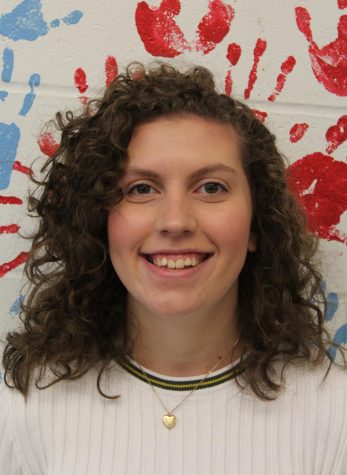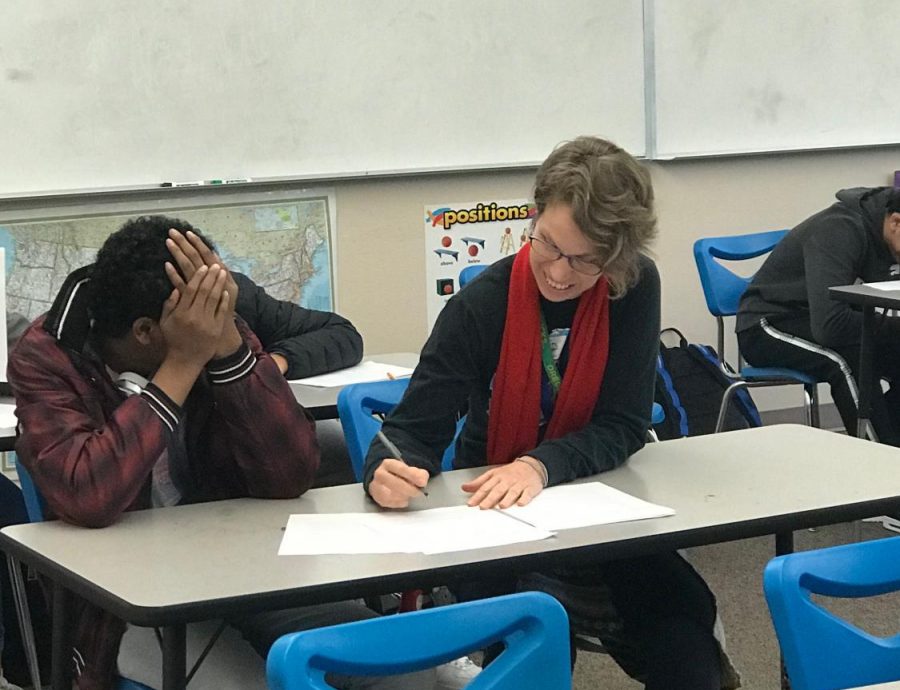Immigrant/Culture Spotlight
Mary Mannen working with an ELD student.
Picture this… you’ve gone to school your entire life with the same group of people, there is always someone familiar around, someone you know you can trust. Imagine leaving everything you’ve known for the past 13 years or so and moving to a foreign country where you don’t speak the language and know no one. It goes unnoticed, but there are real students here at CHS who are living this at this very moment. Students who have left their home country to come here, the land of the free. Unfortunately for them, in order to be free they have to leave everything they’ve ever known and adapt to this foreign land.
Take sophomores Daisy Nguyen and Lorena Rodriguenc for instance, two students who left their home country to come to America. Nguyen left Vietnam in 2016 with her Uncle, who had a business endeavor to pursue in America. Rodriguenc left Mexico in 2016 to live closer to her mother’s family who were already residents in America. Both entering a completely new land for the first time.
Even though these students have already grown up most of their life in their home country going to school or working, when they come to America they are expected to just hop into the American education system and be right on track with all the other students their age. Forgetting the fact that they speak a completely different language and have only been in America for just a few months. Luckily for them, there are teachers such as Mary Mannen and Ried Woodly who teach and help them get settled into America.
Their classes help teach students the English language, basic American history, holidays, science, and math that they would’ve learned in school if they grew up in America. Of course, they cannot teach everything so instead they focus more on what will be needed to know in order to understand other classes that they are going to be required to take throughout high school. “Some words you confuse because they have same pronunciation, but not same meaning,” said Rodriguenc with Nguyen nodding in agreement. Ultimately, the English Language Development (ELD) classes help to make a smoother transition for students who are not accustomed to the English language.
Yes, these students have the same requirements for graduating high school as American students. This can result in these students doubling up in subjects like science or math for a year in order to keep up with all the required classes. Sometimes not all the requirements can be fit into four years for these students so they have to add an extra year to fit it all in, so instead of graduating in four years they’re graduating in five. Some of these students are able to transfer credits they might have from their previous courses if they are transferring later in high school, but that does not always happen. When asked about the way CHS deals with these students, Mannen said, “[There’s] always room for improvement for everything.”
Like all high schools, there are students who do not make it to graduation day. The teachers rarely know what happens to these students when they stop showing up to class. Some situations consist of the students parents pressuring them to work instead of going to school. Others may stop going because they moved or were possibly even deported. Again the teachers aren’t exposed to all of the conditions these students are facing unless the student wants to tell them.
The students who do end up staying though, grow very close to these teachers because they were one of the first people they could trust when they arrived in this foreign land. Rodriguenc agreed saying, “It’s easier to get to know those teachers than other teachers.” The students who have been in this program for a couple of years become very close and the environment is much more family like and are able to open up more. These students get paired up with the new students who have come to America within the past couple months in order to help them adjust. The relationships can be so tight that students who end up graduating sometimes come back to speak about their experiences as an American immigrant. “Horror stories, more like amazing success stories,” said Mannen.
Mannen started as a Spanish teacher and eventually changed positions to become one of CHS’s current English Language Development (ELD) teachers. She explained that she always had a soft spot for students who are studying in a foreign country, especially because she studied abroad herself when she was in college. She was able to relate to the students about what it’s like to not be able to understand what teachers were saying because of a language barrier. “[It’s a] small world, [we are] more connected than we are not,” said Mannen.
These students face a much harder life than most of us could possibly imagine, but when they push through and see the growth that comes out in the end, there’s not much else that could be as rewarding.

This is senior Christa Pierik’s second year in journalism. Other than journalism, Christa is a part of CHS’s Hi-C dance team, girls tennis team, Concert...






